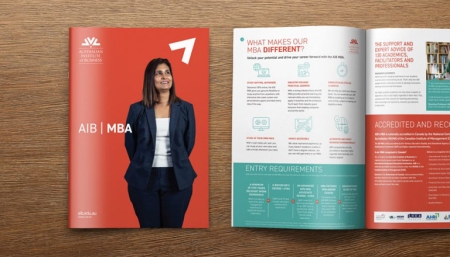Retaining top talent – we can do better.

According to 2022 report by Harvard Business Review, regardless of the size or industry of an organisation, retaining top talent and highly engaged employees is fundamental to success in any organisation. On Thursday the 9th of March, Sallina Jeffrey, AIB Alumni and CEO & Founder of The Mentoring Movement, shared her insights into employee engagement.
About Sallina Jeffrey:
Sallina, an AIB MBA Graduate and the CEO and founder of The Mentoring Movement PTY LTD (TMM). With over 25 years of industry and leadership experience, Sallina has worked for and with big brands like Google, Lego, Westpac, The Cancer Council, Australian Radio Network, Gumtree, Air New Zealand, Virgin, Woolworths and Colliers International, transforming organisations and cultures by being more employee and customer-centric.
Frustrated with the lack of effective solutions to improve engagement and employee experience, Sallina created TMM. Her mission is to decrease the 87% of disengaged employees in the workforce, one workplace at a time.
Millennials & the future of work
“Millennials grew up with digital, they’re naturally digital savvy. And they, unfortunately, leave our organisations within two years. With the global recession looming and also the future of work playing out, we need this generation. They are necessary for the success of our organisations.”
Global attrition & disengagement
“Global attrition is impacting our global economy with $7.8 trillion. On average, we spent 81,396 hours across our lifetime working and the only one thing that we do more of which is quite interesting is sleep.”
At this point, Sallina turned to the audience and asked us how we are all feeling. And with the global stats already at hand, she had the answer for us:
“We are highly disengaged in the workplace. 79% of us are disengaged and unhappy in our workplace. And if we narrow the numbers down to the Australian market, it’s 87%. That leaves us a staggering 21% globally that is engaged in highly engaged in our workplaces, and then the Australian market is 17%. Only 17% of us are happy in our work.”
But what does disengagement actually look like?
“Disengaged is your turn up to work nine o’clock clock on, leave at five – see you later. Highly disengaged is you’re miserable at work, and you’re contributing to a bigger-picture toxic culture. Whilst highly engaged is your thriving and performing.
From the data, it’s very evident that leaders are struggling to unbreak disengagement in the workplace, and something is clearly broken. And for me, I see this as a greater societal problem. Workers cannot be the very soul of our organisations and our society. As leaders, we have a fantastic opportunity to move the needle on this disengagement.”
Sallina then turned our attention to a report by Gallup, in which they conducted research on the connection between engagement at work and satisfaction in our personal lives.
The research showed a positive correlation between employee engagement and employee satisfaction with their personal lives, with 65% of engaged employees reporting personal life satisfaction in contrast to 36% and 24% of not engaged employees and actively disengaged employees respectively showing reporting personal life satisfaction.
“It is evident that disengagement doesn’t just stay at work, it impacts individuals’ personal lives, their mental health, and it breaks down personal relationships.
The data clearly supports disengagement is bigger than the office, and as leaders we want employees to be equally engaged at work and satisfied in their personal lives.”
The opportunity ahead for leaders
“There is a great opportunity for us as individuals, employees, leaders and organisations – we can close the gap between disengagement and engagement. We can impact lives positively shifting our focus to our people.
Future-focused leaders and organisations have realised that if they shift their focus from their profits to people, then that is where the longer-term employee engagement happens, customer satisfaction, productivity, and innovation happens.”
What are the market leaders doing right?
During Sallina’s final project at AIB, she conducted her research on the leading professional services company, Deloitte.
“In Deloitte’s 2021 employee satisfaction survey, they reported a 75% employee engagement result. If we compare this to the global disengagement figures, this is a phenomenal result, topping the global engagement numbers”
Sallina summed up Deloitte was making this possible by ensuring:
- Employees feel heard, seen, valued and respected.
- They feel empowered to express themselves.
- That Deloitte is an ethical place to work.
- Employees feel safe to raise concerns without negative consequences.
- That Deloitte is driving change and doing good in the world.
“Deloitte asks, acknowledges and acts on employee voice. Some organisations ask. Some don’t. Some ask but don’t acknowledge. And some ask and acknowledge, but they don’t act. Deloitte does all three.
And it pays to have thriving workings. Deloitte recorded a 59.3 billion profit in 2022, which is a 19.3% growth, showing if you put your people first the profit will come.”
But what is the underlying factor Deloitte is getting right?
“Deloitte builds high-trust teams, and high-trust teams are high performers. Whereas in contrast, low trust teams kill performance.”
Sallina stressed that despite how controversial it may be, as leaders we need to take ownership and delve into our disengagement numbers and look at what is actually playing out in our organisations and know what is going on in our organisations.
Trust, culture & team performance
“According to sociologist Brene Brown, trust is the very glue that underpins high-performing teams and holds teams together. Without trust, teams fall apart.”
Sallina explained that a more trustworthy culture leads to employees who feel confident, curious and inspired. High-trust teams build happier employees that are more resilient, motivated and persistent.
“Now with a potential global recession looming, we need our people to be more resilient, more motivated and more persistent as this is what will get us through the recession unscathed.”
It pays to have thriving workers
Sallina discussed how trust doesn’t just sustain performance, but how it also sustains profit.
“Organisations that put their people first, report a 23% higher profit, lower absenteeism, lower turnover and higher customer satisfaction.”
How emotional intelligence fits in
“This was the fun part of my MBA and where I really started thinking. So I thought, ok this makes sense; trust builds high performance, distrust is a performance killer so how do leaders build the same trust in organisations when they have different leadership styles, different attributes, and different personalities?”
This is where her research brought her to emotional intelligence.
“Now I know what you’re thinking. “Sallina I know what emotional intelligence is”, “We read about it all the time”, “I’m emotionally intelligent”, I get it. However, data shows that if you don’t have emotionally intelligent leaders in your workplace or even as individuals, you cannot build trust. And if can’t build trust, you cannot build high performance and psychological safety in workplaces.
Daniel Goleman is a psychologist and has spent his life studying emotional intelligence. His research supports that emotional intelligence is the largest single predictor of success in the workplace.
But how does emotional intelligence relate to employee disengagement?
At this point Sallina shared with us the 5 major causes of disengagement, uncovered by Harvard Business Report, which were:
- Unfair treatment
- Lack of support from managers
- Unreasonable time pressure
- Unclear communication from leaders
- Unmanageable workload
So, what do all these factors have in common? Emotionally unintelligent leaders.
“Emotional intelligence builds performance, emotionally unintelligent leaders kill performance and add massively to disengagement in the workplace.
But what sets emotionally intelligent leaders apart from other individuals and other leaders? It’s simply the word ability.”
It’s the ability to:
- Self-regulate in moments of ambiguity and chaos.
- Embrace reverse feedback.
- Be motivated by something BIGGER than themselves.
- Drive sustainable change.
- Understand social cues to drive a narrative or outcome.
Sallina acknowledged that for many workplaces today, talking about our emotions is still taboo and it needs to change.
“If you shut down the talk around emotions and emotional intelligence, you are shutting down the very thing we as leaders are, and we are as humans are. We are built on emotions, and we must have emotions in the workplace.
An issue with workplaces today is people are neither in touch with their emotions nor are properly equipped with the tools to regulate them if they are.”
Emotional Intelligence can be taught
Sallina stressed that this is where opportunities lie. The research’s most positive and comforting piece is that emotional intelligence can be taught and learnt. By fostering an environment that cultivates emotional intelligence as a skill, you can gain a competitive advantage, which is especially vital in the present circumstances.
And as leaders, Sallina stressed that is our responsibility to:
- Generously share knowledge.
- Genuinely care for our people.
- Provide every individual an opportunity to lead.
- Be real, authentic and consistent in our approach.
Summing it up – So, how do we retain top talent?
- Build teams of emotionally intelligent individuals.
- Unleash the power within each individual you lead by getting to know and understand them.
- Lead your people to improve productivity and engagement.
- Empower, inspire and motivate your teams.
“The world needs more people who have come alive, and leaders and teams come alive when they are emotionally intelligent.” – Sallina Jeffrey





